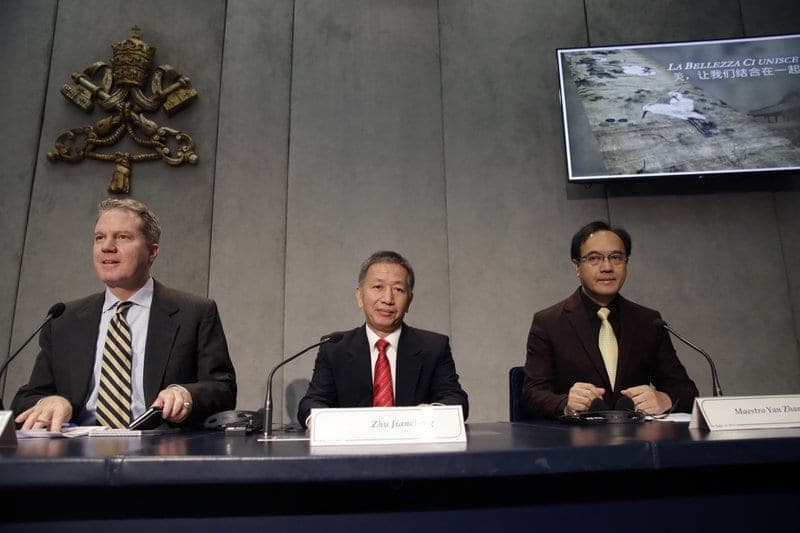ROME — China and the Vatican are planning a first-ever exchange of artworks for exhibits in China and the Vatican Museums, as the two states forge ahead with soft diplomacy amid a stalemate in negotiations to heal decades of diplomatic estrangement.
The parallel exhibits announced Tuesday, involving an exchange of 40 works of art from the Vatican’s collection of Chinese bronzes, ceramics, cloisonne and paintings, and 40 works from China, are due to open simultaneously in March in the Forbidden City and the Vatican’s Anima Mundi ethnological museum.
The head of the government’s China Culture Industrial Investment Fund, Zhu Jiancheng, told a Vatican news conference that he hoped the exchanges would reinforce friendship, build mutual trust and “contribute to the normalization of diplomatic relations.”
The dual exhibitions would “open a new era in people-to-people exchanges between China and the Vatican,” he said. The exhibit in China will travel to four other cities after its Beijing inauguration, including Xian and Shanghai.
The investment fund is a Chinese government and Communist Party vehicle for monetizing soft power initiatives in media, culture and exhibitions. Its shareholders include the Bank of China, the Ministry of Finance and China International Television Corporation, which operate under orders from China’s Cabinet, the State Council, and the ruling party’s Central Committee led by President Xi Jinping.
Pope Francis, and before him Pope Benedict XVI, made normalizing relations with China a priority. But the Vatican and China remain at odds over the Vatican’s insistence that the pope have the authority to name bishops. China views the Vatican position as an infringement on its sovereignty.
Scholars and human rights activists say they only expect Xi’s attitude toward religious and ethnic minorities to become tougher following his appointment to a second term as party leader during the recent party congress.
The Vatican spokesman, Greg Burke, said there remained a mutual interest to keep the relationship going.
“A lot of times cultural exchanges can be a lot easier than strict diplomatic exchanges, and that is what’s happening here,” he told The Associated Press.
Vatican Museum officials declined to enter into the diplomatic standoff, or hopes that it might end, during Tuesday’s news conference announcing the initiative, deferring to their Chinese guests.
But the head of the Vatican Museums, Barbara Jatta, said beauty and art were an “extraordinary vehicle for dialogue.”
China cut relations with the Holy See in 1951, after the Communist Party took power and set up its own church outside the pope’s authority. China has an estimated 12 million Catholics, many of whom worship in non-state sanctioned congregations faithful to the pope that often overlap with the government-sanctioned church.
Francis broke through years of diplomatic stall in 2014 when he sent Xi and the Chinese people a telegram of greeting as he flew through Chinese airspace en route to South Korea. China responded formally in May of this year, when it gave Francis two paintings by artist Zhang Yan in the name of the Chinese people, which are now in the collection of the Vatican Museums.
One of the paintings will be included in the collection of Chinese artworks on display at the Vatican’s show, which is called “Beauty that Unites: travels in the marvelous harmony of the Chinese people and Vatican Museums.” The other Zhang painting will be part of the collection that the Vatican is loaning for the China exhibit, “Anima Mundi (Soul of the World): human, nature and harmony.”
AP writer Christopher Bodeen contributed from Beijing.











